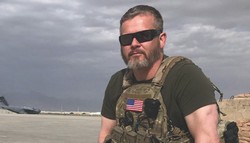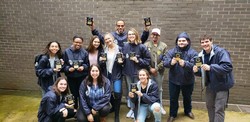The Guardians Club hosted a virtual webinar with Jonathan Sullivan, a Senior Special Agent of the Drug Enforcement Association (DEA), about his career path on Wednesday, Apr. 7.
Sullivan worked with the Border Patrol for the first years of his career before transitioning to the DEA.
Border Patrol was difficult to get into in the 1990s, Sullivan explained. The process was very selective, with only 1 in 800 applicants becoming hired. Once an applicant reaches the academy, there is a 50 percent attrition rate.
“1 in 800 applicants are hired, but 1 in 1600 applicants actually makes it through the entire process,” Sullivan explained. “I applied, got hired and went through the academy. It was hard, I’m not going to joke at all. The Border Patrol academy was very difficult back then. Running, pushups, situps, calisthenics, firearms, and academics.”
The academy required applicants to learn immigration law and graduate with Spanish language proficiency.
Fifty-four people were alongside Sullivan in class, but only 35 graduated in May of 1997. He reported a week later to his first assignment in Laredo, Texas.
“Laredo was, at the time and still is, the Wild West,” Sullivan said. “There is an insane amount of undocumented travelers that cross through. It was never anything personal, it was a job. We all understood that they were doing the same thing that we would have been doing if we were in their place. But it was their job to try to get into the country and it was our job to catch them.”
Sullivan spent his first year of Border Patrol doing regular patrol duties. About a year and a half later, he was assigned to the Special Operations Group and worked on a surveillance platform.
“That surveillance platform was a pickup truck with a $60,000 thermal camera mounted in the back,” Sullivan said. “It had a telescopic boom. The boom would go up about 30 feet in the air above the bed of the truck and we could literally see for miles and miles. My job was to sit and watch. It was a plain clothes job in an unmarked vehicle and I worked on my own.”
Sullivan would identify illegal travelers or drugs crossing through areas and alert marked units to pursue them. He was sometimes required to pursue dozens of travelers at once on his own. “It makes you very confident,” Sullivan said. “It teaches you a lot about situations you can handle. The learning curve is incredible.”
He worked that position for another year and a half before being rotated off to a Border Patrol National Tactical Unit. “That was a great time,” Sullivan said. “While I thought I learned an amazing amount of stuff before, the learning curve just got even faster.”
Sullivan and the unit completed many different kinds of drug interdiction work across the country. He was deployed after the 9/11 attacks to do security work, as well as executive protection work with cabinet level members, he explained.
“I went to Arizona for seven weeks,” Sullivan said. “I lived in a hotel, but I was basically in a desert every night, 12 hours a day, 4 p.m. to 4 a.m.”
Following the tactical unit, Sullivan took the opportunity to teach at the Border Patrol academy. “Teaching for me, being an instructor, helped me re-learn all the things I learned as a basic agent,” Sullivan said. “By re-teaching all the things that I learned to my trainees, I got that much better. It just solidified all those skills in me.”
After 8 years in Border Patrol, Sullivan said he could not picture himself in his 50s chasing illegal travelers through brush. ”I needed to be able to use my mind more,” Sullivan said. “I talked to some people that I knew in the DEA and they put me in touch with a recruiter. I talked to a recruiter and next thing I know, two years later I’m in the DEA Academy.”
Sullivan went through the DEA academy in December of 2004. The DEA academy is challenging in a very different way, Sullivan said. “Academically, it’s not ridiculously hard, but the standards are high. You need at least an 80 percent in every class in order to graduate.”
The difficulty of the DEA academy is the professional standards it holds you to, Sullivan explained. “They expect you to act like a professional all the time. In the Border Patrol academy, when you were off, it was very relaxed. In the DEA academy, when you’re off, you’re still on. They want true professionals 24 hours a day. No goofing around, no joking. The reason for that is because when you get hired, graduate from the academy and make it to the field, you have an incredible amount of freedom.”
PHOTO TAKEN from East Auora Advertiser



